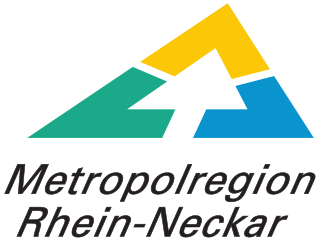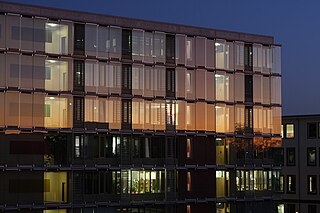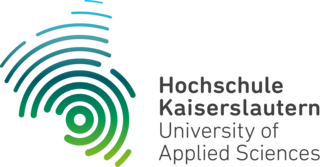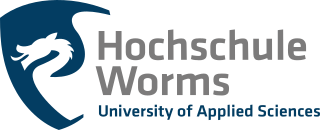
The Rhine-Neckar Metropolitan Region, often referred to as Rhein-Neckar-Triangle, is a polycentric metropolitan region located in south western Germany, between the Frankfurt/Rhine-Main region to the North and the Stuttgart Region to the South-East.

The Environmental Campus Birkenfeld (ECB) is a branch of the Hochschule Trier in the state of Rhineland-Palatinate, Germany. It is close to the small town of Birkenfeld in Rhineland-Palatinate, close to the border of Saarland, Luxembourg, Belgium and France. There are 2,500 students enrolled in two departments. There are a total of 59 professors teaching in both departments.
The Trier University of Applied Sciences is one of the largest Universities of Applied Sciences in Rhineland-Palatinate with approximately 6000 students, around 170 professors and around 700 academic and nonacademic staff. It is spread over three campuses in Trier, Birkenfeld, and Idar-Oberstein. It is a member of the European University Association (EUA).

The Frankfurt University of Applied Sciences is a public University of Applied Sciences in Frankfurt am Main, Germany.

Birkenheide is a municipality in the Rhein-Pfalz-Kreis, in Rhineland-Palatinate, Germany and is part of the Verbandsgemeinde Maxdorf.
Lucerne University of Applied Sciences and Arts (HSLU) is one of seven regional, public-funded universities of applied sciences founded in 1997 in its current form. The University was called University of Applied Sciences of Central Switzerland until 15 October 2007. Lucerne University of Applied Sciences and Arts is a Swiss public vocational university with campuses in Lucerne, Horw, Emmenbrücke and Rotkreuz. Prior to Rotkreuz, a small campus in Zug for finance was held.
The Zürich University of Applied Sciences is a governing body composed of four separate universities. It is located in the city of Winterthur, with facilities in Zürich and Wädenswil, is the second largest University in Switzerland after the University of Zurich.

Cologne University of Applied Sciences, officially called TH Köln – University of Applied Sciences is an institute of higher education located in Cologne, Germany, established in 1971. It was created from a merger of numerous smaller colleges, the oldest of which was the Royal Provincial Trade School, founded in 1833, and renamed Trade College of the City of Cologne on 15 December 1879.

The City University of Applied Sciences is a public Fachhochschule, a University of Applied Sciences, located in Bremen, Germany. In 1982, this University evolved from the fusion of four Universities of Applied Sciences: the Universities for technology, business, social pedagogy and social economy, and nautics.
The Mainz University of Applied Sciences, is a 1971-founded university located in Mainz, Germany. The University of Applied Sciences Mainz consists of three faculties: School of Technology, School of Design and School of Business. The common feature of all fields of study is the practical orientation of the university, the short periods of study and the internationally orientated courses. In 2009 the School of Business, the School of Engineering with the departments Geoinformatics and Surveying and the administration of the university moved to the new location "Campus". All other departments will move as well in the near future to the new location "Campus".

Heilbronn University of Applied Sciences,, is a German University of Applied Sciences with campuses in Heilbronn-Sontheim, in the centre of Heilbronn (Bildungscampus), in Künzelsau and Schwäbisch Hall. Heilbronn University of Applied Sciences ranks amongst the major institutions of Higher Education in the state of Baden-Württemberg where it caters for over 8,000 degree-seeking students on three campuses, namely Heilbronn, Künzelsau and Schwäbisch Hall.

The RheinMain University of Applied Sciences, formerly University of Applied Sciences Wiesbaden, is a university located in Wiesbaden, Germany, founded in 1971. It is part of the IT-Cluster Rhine-Main-Neckar, the "Silicon Valley of Europe".

The Kaiserslautern University of Applied Sciences is a Hochschule with 3 campuses located in Kaiserslautern, Germany, in Pirmasens, Germany and in Zweibrücken, Germany. With about 6300 students, it is one of the largest Universities of Applied Sciences in the state of Rhineland-Palatinate. Kaiserslautern University of Applied Sciences stands for over 160 years of tradition in engineering education.
Koblenz University of Applied Sciences is a public university in Rhineland-Palatinate. Although the present university was established in 1996, it has a rich tradition in higher education. The roots of today's Faculty of Materials Engineering, Glass and Ceramics in Hoehr‑Grenzhausen, come down to the 19th century.

Worms University of Applied Sciences is a business and technology-oriented university of applied sciences in Worms, Germany. Around 3700 students are taught in 38 degree programmes by 74 professors and around 100 lecturers.
The Regensburg University of Applied Sciences is a university of applied sciences (UAS) in Regensburg, Germany. It was founded in 1971 as a college for technology, business and social work, but has roots in the mid 19th century. Today the university is one of the largest institutions of applied sciences in Bavaria. Its eight faculties offer 28 Bachelor's degree programs, 20 Master's degree studies as well as five postgraduate courses. Emphasis is laid on Engineering and Computer Sciences, and Law, Economic and Social Sciences.
The Hochschule Bonn-Rhein-Sieg University of Applied Sciences is a German University of Applied Sciences with more than 9,500 students and 150 professors. Its campus comprises three distinct locations, situated in Sankt Augustin, Rheinbach and Hennef / Sieg.

IU International University of Applied Sciences is a private University of Applied Sciences based in Erfurt, Germany.
Osnabrück University of Applied Sciences is a university of applied science in Lower Saxony, whose administrative centre is in Osnabrück. It has existed in its current form since 2003, having originally opened in 1971. Some of its departments can be traced back to engineering schools and other colleges operating as early as the 1950s.

The Ludwigshafen University Library supplies the Ludwigshafen University of Business and Society with literature for research and higher education purposes. Users are primarily students and lecturers, although the library is open to the general public. In the CHE ranking the Ludwigshafen University Library holds a top position in the rated courses of study.













